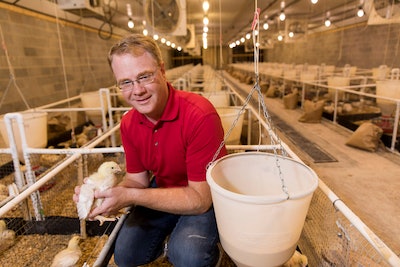
It’s that time of year, when we see students packing up as they prepare for the fall college semester.
For many students, they are returning to familiar territory, but for incoming freshman and transfer students, it’s a whole new experience.
Some of these youngsters have picked a major and have a career path in mind. Others are still trying to figure things out.
Perhaps many might eventually decide upon a poultry science major. I recently listened to a Cultivating Curiosity podcast, in which Todd Applegate, University of Georgia (UGA) Department Head and R. Harold and Patsy Harrison Chair in Poultry Science, made a strong case for students to decide upon or remain with a major in the field.
What is taught?
UGA is one of only six universities in the United States that has a department specifically devoted to poultry science. He says that is somewhat of a “sad commentary” since poultry is “one of the most consumed meats and proteins in the country.”
But because of that, UGA does its best to leave no stone unturned in training students for a future in the poultry industry, regardless of what the capacity might be.
“We are everything you can think of that would go into producing a chicken,” Applegate said.
Applegate said that includes the following disciplines:
Housing and engineering: Students are taught the best ways to provide “the optimal environment” for poultry.
Poultry health and well-being: The university stresses the science behind making sure birds are healthy and “understanding the science behind well-being and outcomes for that bird.”
Sustainability: Students learn lessons in rearing chickens with minimal impact on the environment.
He also said much attention is given to poultry genetics and producing the end products for the consumer.
Not just broilers
While Georgia is typically known as a broiler-producing state, the science for producing laying hens, breeder birds, turkeys, ducks and gamebirds is also taught.
“We need to focus on making sure our students are exposed to issues with a range of the poultry sector,” Applegate said.
Job opportunities
When talking to prospective students and their parents, Applegate said poultry science “is more than what you probably see driving up and down the road in Georgia.”
Most of UGA’s bachelor-level graduates in poultry science find employment as “people and process managers.”
“Our graduates are going directly to either poultry companies as managers in live production, the hatcheries, the feed mills, or the processing facilities, ensuring quality control and safety of those products.”
However, many graduates also gain employment in allied industries. Those positions could involve finance and credit, sales and marketing, insurance programs, or products that are used by the industry such as feed additives, pharmaceuticals, equipment or packaging.
“You name it, there’s quite a definite need across the breadth of that sector,” he said.
Because about 45% of U.S. poultry exports pass through the port in Savannah, UGA graduates also find opportunities in various stages of the supply chain including ”maintaining a cold chain.”
He also said many customers of the poultry industry also look to poultry science graduates for their expertise.
“Zaxby’s, Chick-fil-A, (Raising) Cane’s that we all enjoy as consumers, they employ some of our poultry graduates to make sure that the product that they’re getting from companies producing chicken is meeting their standards as that end customers,” Applegate said.
He added that even more specialized opportunities present themselves for students that go on to earn advanced degrees in poultry science.
Those are just a few highlights of the 46-minute podcast. If you want to learn more about the opportunities that a poultry science degree can open doors for, listening to this podcast would be time well-spent.


















